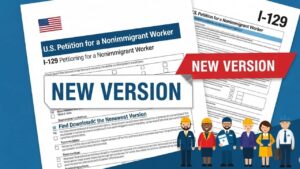Latest Updates
Navigating the New Form I-129: A Practical Guide for U.S. Employers and Nonimmigrant Workers
The US Petition for a Nonimmigrant Worker Form I-129 new version was released and is now mandatory. This guide demystifies the changes, from the new H-1B beneficiary-centric lottery to updated fees, offering actionable advice for a successful filing.
A Comprehensive Guide to the DARA PhD Fellowship Programme 2025 for Research Reviewers
Navigating the prestigious DARA PhD Fellowship Programme 2025 for Research Reviewers can feel like an exciting yet complex journey. This guide is crafted to ...
Beat the Rush: Your Guide to New Zealand Student Visa Applications for the 2025 Mid-Year Intake
Planning to study in New Zealand? Our essential guide to New Zealand student visa applications 2025 helps you beat the mid-year rush. Get expert tips, a step-by-step checklist, and the latest official advice to ensure a smooth process.
Your Essential Guide to the University of Liverpool’s UK Visa Webinar: Secure Your Study Abroad Dream
Navigate the UK student visa process with confidence. This essential guide to the UK Visa Webinar Invitation by University of Liverpool offers expert advice, a pre-webinar checklist, and a clear breakdown of requirements to help you successfully secure your place.
Spain Study Visa New Policy: Your 2025 Guide to Studying in Sunny Spain
Navigating the Spain Study Visa New Policy? Our 2025 guide details the crucial changes implemented from June onwards. Discover new work rights, an updated application process, and what it means for your studies in Spain.
Sir Edward Youde Memorial Scholarships 2026 for Overseas Studies: Your Definitive Application Guide
Your complete guide to the Sir Edward Youde Memorial Scholarships 2026 for Overseas Studies. Get expert tips, eligibility details, and a step-by-step plan to navigate your application for this prestigious Hong Kong scholarship and study at a top global university.
Unlocking Your Dream: The 2026 University of Tokyo MEXT University Recommended Scholarship
Secure your future with the 2026 University of Tokyo MEXT University Recommended Scholarship. This guide provides comprehensive, actionable insights on eligibility, application steps, and life as a scholar in Japan, empowering you to navigate the process for this fully funded opportunity.
Your Gateway to a Korean University: The Ultimate Guide to the Study in South Korea Webinar 2026
Dreaming of studying in South Korea? Your journey begins with the official Study in South Korea Webinar 2026. This guide provides an exclusive look into this pivotal event, offering actionable advice on securing your spot and making your academic dreams a reality.
Your 2025 Guide to Scotland’s New Visas: A New Chapter for Your Scottish Dream
Planning a move to Scotland? Our 2025 guide to Scotland's new visas to be launched in 2025 has you covered. Discover the proposed Rural and Graduate visas, understand the latest UK-wide rule changes, and get actionable advice for your application.
Apple Scholars in AI/ML 2026 at the University of Munich: Your Ultimate Guide
Unlock your potential with the Apple Scholars in AI/ML 2026 PhD Fellowship at University of Munich. This comprehensive guide provides expert advice on eligibility, benefits, and the nomination process to help you secure this career-defining opportunity in artificial intelligence and machine learning.
















